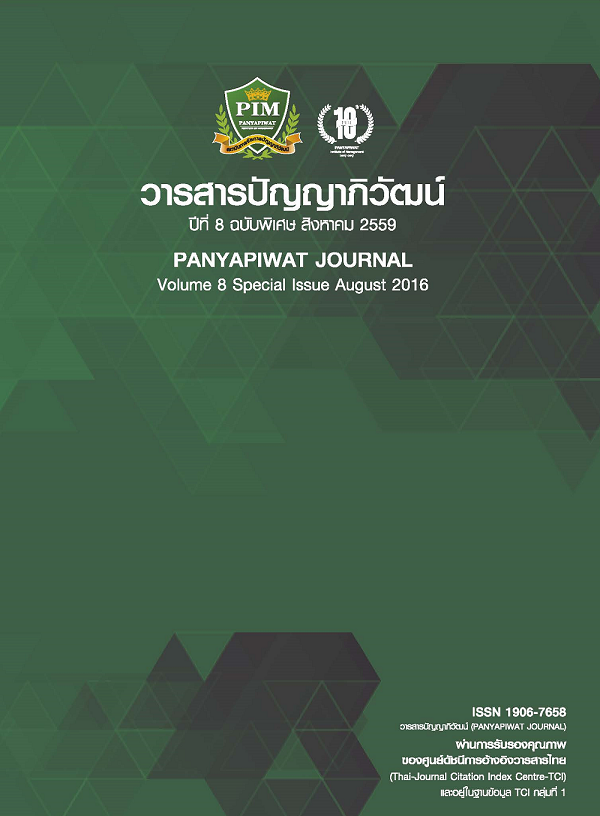ปัจจัยที่ส่งผลต่อการมีจิตสาธารณะของนักศึกษาวิทยาลัยเซนต์หลุยส์
Main Article Content
บทคัดย่อ
การวิจัยครั้งนี้มีวัตถุประสงค์ 1) ศึกษาระดับจิตสาธารณะ การสนับสนุนทางสังคม อัตมโนทัศน์ และเหตุผลเชิงจริยธรรม ของนักศึกษาวิทยาลัยเซนต์หลุยส์ 2) เพื่อเปรียบเทียบจิตสาธารณะการสนับสนุนทางสังคม อัตมโนทัศน์ และเหตุผลเชิงจริยธรรม ของนักศึกษาจำแนกตามคณะวิชา และชั้นปี และ 3) เพื่อหาปัจจัยที่ส่งผลต่อจิตสาธารณะของนักศึกษา กลุ่มตัวอย่างเป็นนักศึกษาชั้นปี 1-4 คณะพยาบาลศาสตร์ คณะกายภาพบำบัด และคณะศิลปศาสตร์ จำนวน 809 คน เครื่องมือเป็นแบบสอบถาม ซึ่งมีค่าความเชื่อมั่นทั้งฉบับ คือ 0.89 สถิติที่ใช้ในการวิเคราะห์ข้อมูล ค่าร้อยละ ค่าคะแนนเฉลี่ย ส่วนเบี่ยงเบนมาตรฐาน ค่าความแตกต่างทางสถิติ t-test และ F-test โดยวิเคราะห์ความแปรวนทางเดียวซึ่งใช้วิธีการของเซพเฟ่ และการวิเคราะห์การถดถอยพหุคูณ
ผลการวิจัยพบว่า 1) การศึกษาระดับจิตสาธารณะ ของนักศึกษาวิทยาลัยเซนต์หลุยส์ พบว่า ส่วนใหญ่เป็นเพศหญิง โดยภาพรวม (ค่าเฉลี่ย เท่ากับ 3.89) อยู่ในระดับมาก เมื่อพิจารณาเป็นรายด้าน พบว่า อยู่ในระดับมากทุกด้าน เรียงลำดับดังนี้ ด้านการมีส่วนร่วมในการดูแลรักษา ด้านการเคารพสิทธิในการใช้สิ่งของส่วนรวม และด้านความตระหนักถึงปัญหาที่เกิดขึ้นต่อส่วนรวม (ค่าเฉลี่ยเท่ากับ 4.09, 3.99, 3.58) 2) การศึกษาเปรียบเทียบจิตสาธารณะของนักศึกษา จำแนกตามสถานภาพของนักศึกษา พบว่า นักศึกษาที่มีชั้นปีต่างกันโดยรวม มีจิตสาธารณะแตกต่างกันอย่างมีนัยสำคัญทางสถิติที่ระดับ 0.05 โดยนักศึกษาชั้นปีที่ 4 มีจิตสาธารณะสูงกว่าชั้นที่ 3, 2 และ 1 และพบว่า นักศึกษาที่เรียนคณะวิชาต่างกันมีจิตสาธารณะโดยรวมไม่แตกต่างกันอย่างมีนัยสำคัญทางสถิติที่ระดับ 0.05 และ 3) ปัจจัยที่ส่งผลต่อการมีจิตสาธารณะของนักศึกษา พบว่า การสนับสนุนทางสังคม (β = 0.267) อัตมโนทัศน์ (β = 0.198) และเหตุผลเชิงจริยธรรม (β = 0.331) ส่งผลต่อจิตสาธารณะอย่างมีนัยสำคัญทางสถิติที่ระดับ .01
The objectives of this research were (1) to study the level of public mind, social support, self-concept, and moral reasoning of Saint Louis College’s students, (2) to compare the public mind, social support, self-concept, and moral reasoning of Saint Louis College’s students in different faculties and studying years, and (3) to identify the factors affecting the public mind of students. The subjects of this study were 809 Saint Louis College’s students studying in the year 1-4 of the Faculty of Nursing Science, the Faculty of Physical Therapy, and the Faculty of Liberal Arts. The research instrument was the questionnaire with the reliability of 0.89.
The research data were statistically analyzed by percentage, average, standard deviation, t-test, f-test by one-way ANOWA in Scheffe’s method and multiple regression analysis. The research findings were as follows: Studying the public mind of Saint Louis College’s students, mostly female, it was found that the overall average was 3.89, stood at high level. Analyzing each aspect, it was found that the average stood at high level in all aspects including the participation and involvement, the respect of the use of public facilities, and the recognition of public problems with the mean scores of 4.09, 3.99, and 3.58 respectively. Studying the public mind of Saint Louis College’s students categorized by student status, it was found that the students in different studying years were different in public mind with the statistical significant level of 0.05. In other words, the level of public mind of the fourth year students was higher than that of the third, second, and first-year students respectively. Additionally, the levels of public mind of students in different faculties were not different with the statistical significant level of 0.05.Studying the factors affecting the public mind of students, it was found the social support (β=0.267), the self-concept (β=0.198), and the moral reasoning (β=0.331) affected the public mind of students with the statistical significant level of 0.01.
Article Details
“ข้าพเจ้าและผู้เขียนร่วม (ถ้ามี) ขอรับรองว่า บทความที่เสนอมานี้ยังไม่เคยได้รับการตีพิมพ์และไม่ได้อยู่ระหว่างกระบวนการพิจารณาลงตีพิมพ์ในวารสารหรือแหล่งเผยแพร่อื่นใด ข้าพเจ้าและผู้เขียนร่วมยอมรับหลักเกณฑ์การพิจารณาต้นฉบับ ทั้งยินยอมให้กองบรรณาธิการมีสิทธิ์พิจารณาและตรวจแก้ต้นฉบับได้ตามที่เห็นสมควร พร้อมนี้ขอมอบลิขสิทธิ์บทความที่ได้รับการตีพิมพ์ให้แก่สถาบันการจัดการปัญญาภิวัฒน์หากมีการฟ้องร้องเรื่องการละเมิดลิขสิทธิ์เกี่ยวกับภาพ กราฟ ข้อความส่วนใดส่วนหนึ่งและ/หรือข้อคิดเห็นที่ปรากฏในบทความข้าพเจ้าและผู้เขียนร่วมยินยอมรับผิดชอบแต่เพียงฝ่ายเดียว”
เอกสารอ้างอิง
กระทรวงศึกษาธิการ. (2553). หลักสูตรแกนกลางการศึกษาขั้นพื้นฐาน พุทธศักราช 2551. กรุงเทพฯ: โรงพิมพ์ชุมนุมสหกรณ์การเกษตรแห่งประเทศไทย.
ขณิดา นันทะวัน. (2554). ปัจจัยที่ส่งผลต่อจิตสาธารณะของนักศึกษาระดับปริญญาตรีคณะคุรุศาสตร์. การศึกษามหาบัณฑิตวิจัยและประเมินผลการศึกษา มหาวิทยาลัยนเรศวร.
ชัยวัฒน์ สุทธิรัตน์. (2552). นวัตกรรมการจัดการเรียนรู้ที่เน้นผู้เรียนเป็นสำคัญ. กรุงเทพฯ: บริษัท แดเน็กซ์ อินเตอร์คอร์ปปอเรชั่น.
ดลฤดี จันทร์แก้ว. (2558). ปัจจัยที่ส่งผลต่อจิตสาธารณะของนักศึกษาระดับปริญญาตรี มหาวิทยาลัยราชภัฏอุบลราชธานี.วารสารบัณฑิตศึกษามหาวิทยาลัยราชภัฏวไลยอลงกรณ์ ในพระบรมราชูปถัมภ์, 9(1), 129.
บุญธิดา ยอดสุวรรณ. (2556). ระดับความมีจิตสาธารณะของนักศึกษามหาวิทยาลัยแม่ฟ้าหลวง. รัฐประศาสนศาสตร-มหาบัณฑิต มหาวิทยาลัยแม่ฟ้าหลวง.
ยุทธนา วรุณปิติกุล. (2552). สำนึกพลเมือง: ความเรียงว่าด้วยประชาชนบนเส้นทางประชาคม. กรุงเทพฯ: มหาวิทยาลัยมหิดล.
ลัดดาวัลย์ เกษมเนตร และคณะ. (2547). รูปแบบการพัฒนานักเรียนระดับประถมศึกษาให้มีจิตสาธารณะ: การศึกษาระยะยาว. เอกสารประกอบการประชุม. สถาบันวิจัยพฤติกรรมศาสตร์, มหาวิทยาลัยศรีนครินทรวิโรฒ.
สำนักงานคณะกรรมการการศึกษาขั้นพื้นฐาน กระทรวงศึกษาธิการ. (2553). แนวทางการจัดกิจกรรมพัฒนาผู้เรียนตามหลักสูตรแกนกลางการศึกษาขั้นพื้นฐาน พุทธศักราช 2550 (พิมพ์ครั้งที่ 2). กรุงเทพฯ: โรงพิมพ์ชุมนุมสหกรณ์การเกษตรแห่งประเทศไทย.
สุนทร ช่องชนิล. (2556). การพัฒนาปัจจัยที่ส่งผลต่อจิตสาธารณะของบุคลากรในโรงพยาบาลเอกชนคาทอลิก.วิทยานิพนธ์ (ศษ.ด.) สาขาวิชาการบริหารการศึกษา มหาวิทยาลัยวงษ์ชวลิตกุล.
สุริยเดว ทรีปาตี. (2549). ผลวิจัยชี้ “เด็กไทย” อยากเรียนเก่ง แต่ขาดจิตสำนึกสาธารณะ. สืบค้นเมื่อ 15 กรกฎาคม 2558, จาก http://www.manager.co.th/QOL/ViewNews.aspx?NewsID=9490000154348
อริยา คูหา. (2554). จิตสาธารณะและรูปแบบการดำเนินชีวิตของนักศึกษา มหาวิทยาลัยสงขลานครินทร์ วิทยาเขตปัตตานี. วารสารมหาวิทยาลัยนราธิวาสราชนครินทร์, 3(2), 81-93.
Translated Thai References
Chongchanil, S. (2013). The development of the factors affecting the Public Mind of the personnel in a private hospital Catholic. Doctor of Philosophy in Educational Administration (Ph.D.), Vongchavalitkul University. [in Thai]
Jankeaw, D. (2015). Factors Affecting Towards Public Mind Of Ubon Ratchathani Rajabhat University's students. Journal Of Graduate Studies Valaya Alongkron Rajabhat University, 9(1), 129. [in Thai]
Kasemnet, L. et al. (2003). The Development model of elementary school students to have Public Mind: a longitudinal study. The document in the meeting Behavioral Science Research Institute, Srinakharinwirot University. [in Thai]
Kuha, A. (2011). Public Mind and Lifestyle of Prince of Songkla University’ Students, Pattani Campus. Princess of Naradhiwas University Journal, 3(2), 81-93. [in Thai]
Ministry of Education. (2010). The Basic Education Core Curriculum B.E. 2551 (A.D. 2008). Bangkok: The Agricultural Co-operative Federation of Thailand. [in Thai]
Nantawan, K. (2011). Factors Affecting Towards Public Mind Of Undergraduate Faculty Of Education.Master of Education Program in Measurement and Evaluation, Naresuan University. [in Thai]
Office of the Basic Education Commission, Ministry of Education. (2010). The Activities of the Students of the Basic Education Core Curriculum B.E. 2551 (A.D. 2008) (2nd ed). Bangkok: The Agricultural Co-operative Federation of Thailand. [in Thai]
Sutthirat, C. (2009). Innovative Learning Outcome of Student-centered learning. Bangkok: Danex Intercorporation. [in Thai]
Tripathi, S. (2006). The Research Results “Thai children.” wanted to study but Lack of public consciousness. Retrieved July 15, 2015, from http://www.manager.co.th/QOL/ViewNews.aspx? NewsID=9490000154348 [in Thai]
Waroonpitikul, Y. (2009). Civic consciousness: Essay on people on the road of society. Bangkok: Mahidol University. [in Thai]
Yodsuwan, B. (2013). Level of public consciousness of mae fah luang University undergraduate students. Master of Public Administration Program, Mae Fah Luang University. [in Thai]


